
Lea Grinberg, MD, PhD, a neuropathologist at Mayo Clinic Florida, discussed how tau accumulation and orexin neuron loss drive early sleep disturbances in Alzheimer disease and the potential for sleep-based biomarkers.

Lea Grinberg, MD, PhD, a neuropathologist at Mayo Clinic Florida, discussed how tau accumulation and orexin neuron loss drive early sleep disturbances in Alzheimer disease and the potential for sleep-based biomarkers.
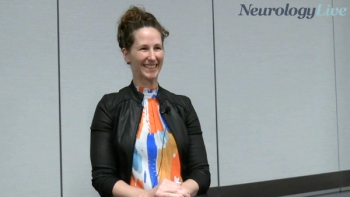
The headache neurologist at the Barrow Neurological Institute talked about an international expert panel that established agreed-upon definitions for refractory and resistant migraine. [WATCH TIME: 4 minutes]
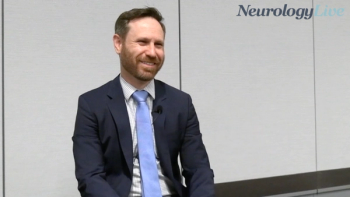
At AHS 2025, the associate clinic director at the UC San Diego talked about the cautious use of cannabinoids in migraine and the importance of standard therapies before cannabinoids. [WATCH TIME: 3 minutes]
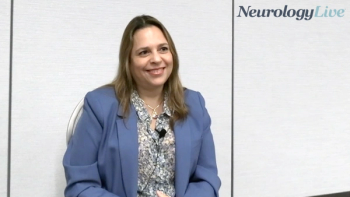
The director of the Brotman Facial Pain Clinic at the University of Maryland talked about emerging preclinical evidence supporting adenosine A3 receptor activation for post-traumatic trigeminal neuropathic pain. [WATCH TIME: 5 minutes]

At AHS 2025, Elizabeth Seng, PhD, professor of neurology at Albert Einstein College of Medicine, presented findings from a study showing that migraine was associated with increased odds of ischemic stroke in veterans.
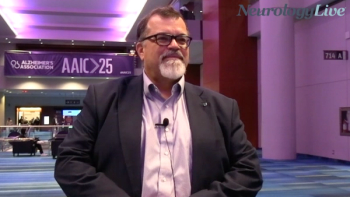
The chief scientific officer at Alzheon talked about a symposium on the role of amyloid-beta oligomers in AD and phase 3 clinical data of valiltramiprosate presented at AAIC 2025. [WATCH TIME: 5 minutes]
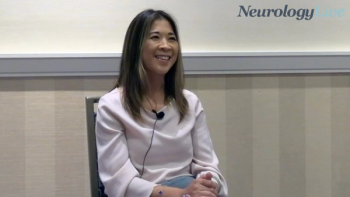
The physician assistant specializing in Parkinson disease talked about how comorbidities and patient preference guide clinical decisions in prescribing on-demand therapies for Parkinson disease. [WATCH TIME: 5 minutes]

The CEO and cofounder of LSVT Global highlighted the importance of clinicians referring their patients with Parkinson disease early to evidence-based physical therapies, occupational therapies, and speech therapies. [WATCH TIME: 5 minutes]

At AAIC 2025, the founder and CEO at Veravas discussed the company’s VeraBIND tau pathology blood test, highlighting its potential to detect Alzheimer disease earlier with high accuracy. [WATCH TIME: 4 minutes]

At AAIC 2025, the chief executive officer at ALZpath discussed the growing adoption of the company’s pTau217 antibody blood test for AD research, emphasizing its potential role in early detection. [WATCH TIME: 4 minutes]
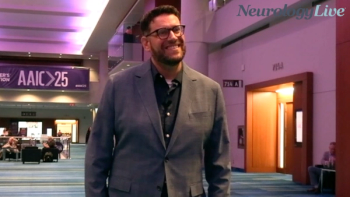
The principal scientist of neuroscience discovery at Merck presented preclinical data at AAIC 2025 supporting the development of MK-2214, an anti-tau antibody designed to slow or prevent the progression of AD. [WATCH TIME: 5 minutes]

At the 2025 ATMRD Congress, Anissa Mitchell, LCSW, chief program officer at PMD Alliance, discussed immersive, patient-focused sessions aimed at improving clinicians’ empathy, communication, and understanding of Parkinson disease and related disorders.
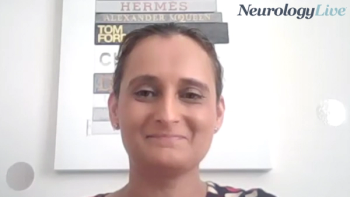
The medical director of CNS clinical cevelopment at AskBio discussed long-term data presented at ATMRD from the company’s phase 1b trial assessing the investigational gene therapy AB-1005 in Parkinson disease. [WATCH TIME: 6 minutes]

At AAIC 2025, Alberto Ramos, MD, FAAN, director of the sleep disorders program at the University of Miami, discussed the association between long sleep duration, specific sleep phenotypes, and progressive cognitive decline in Hispanic populations.
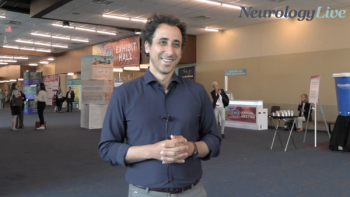
At CMSC 2025, assistant professor of neurology at the University of California, San Francisco discussed progress on the integration of biomarkers into clinical practice for multiple sclerosis. [WATCH TIME: 4 minutes]

Researchers unveil promising findings from the GABriella trial, exploring a novel treatment for prodromal Alzheimer's disease at AAIC 2025.

A new study reveals higher rates of postpartum depression in women with multiple sclerosis, emphasizing the need for early screening and management strategies.

Richard Kovacs, MD, PhD, chief medical officer for the American College of Cardiology, discusses interim XYLO trial results, highlighting how switching to low-sodium oxybate can significantly impact blood pressure and cardiovascular risk profiles in narcolepsy.

The chief medical officer at Acumen Pharmaceuticals discussed the benefits of using the blood-based p-tau 217 biomarker to improve screening accuracy and reduce patient burden in AD. [WATCH TIME: 5 minutes]

The cofounder and chief science officer of the Alzheimer's Drug Discovery Foundation recapped some of the notable recent developments in the Alzheimer disease field presented at the 2025 Alzheimer’s Association International Conference.

Sam Gandy, MD, PhD, director of the Center for Cognitive Health at the Icahn School of Medicine at Mount Sinai, discussed his presentation on detecting toxic amyloid-β oligomers and their role in AD pathology at AAIC 2025.

Discover groundbreaking insights from the 2025 Alzheimer’s Association International Conference, featuring expert interviews on innovative treatments and diagnostics.

A recent meta-analysis reveals genistein's potential to enhance cognitive function in prodromal Alzheimer disease, urging further research for validation.
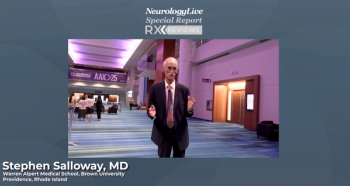
In the third episode, Salloway emphasizes the need for careful patient selection when prescribing donanemab to minimize serious risks, highlighting the value of the newly approved safer dosing regimen. Supported by Eli Lilly.

A recent analysis highlights the increasing use of Octave's MSDA test in managing multiple sclerosis, showcasing its impact on treatment decisions and disease monitoring.

Dementia expert Stephen Salloway, MD, PhD, overviews the stepwise donanemab regimen approved by the FDA, citing how it not only reduces ARIA rates but preserves the same level of amyloid reduction as the original dosing. Supported by Eli Lilly.

New findings reveal ACP-204 shows no significant QT interval prolongation in healthy adults, supporting its safety for Alzheimer disease psychosis treatment.

Expert Stephen Salloway, MD, discussed findings from the TRAILBLAZER-ALZ 6 study, highlighting how a stepwise donanemab dosing regimen significantly lowered rates of ARIA in early Alzheimer disease. Supported by Eli Lilly.

The corporate vice president of medical information and research at Theranica discussed long-term findings presented at AHS 2025 covering the company’s Nerivio remote electrical neuromodulation device for patients with migraine. [WATCH TIME: 5 minutes]

Two experts from Cerevance discussed data from the company’s posters recently presented at AAIC 2025, which highlighted potential therapeutic targets for Alzheimer disease. [WATCH TIME: 5 minutes]